#Sodor Island
Explore tagged Tumblr posts
Text

Discover the enchanting world of Thomas and Friends with our captivating infographic! Join Thomas the Tank Engine and his cheerful locomotive companions on a thrilling railway adventure. Delve into fascinating facts, charming characters, and mesmerizing destinations that have captivated generations of children and adults alike. From the bustling Sodor Island to the iconic Tidmouth Sheds, this infographic offers a visual delight for fans of all ages. Get ready to explore the rich history, heartwarming stories, and valuable life lessons that make Thomas and Friends a beloved franchise. Hop aboard as we embark on a delightful journey through the magical world of Thomas and Friends!
#Thomas and Friends#Railway Adventures#Infographic#Sodor Island#Tidmouth Sheds#Locomotives#Children's Entertainment#Childhood Memories#Beloved Characters#Railway History#Life Lessons.
0 notes
Text
#ttte#brendambois#thomas and friends#thomas the tank engine#island of sodor#the island of sodor#edward the blue engine#ttte edward#Edward#edward ttte#trouboulsome trucks
88 notes
·
View notes
Text

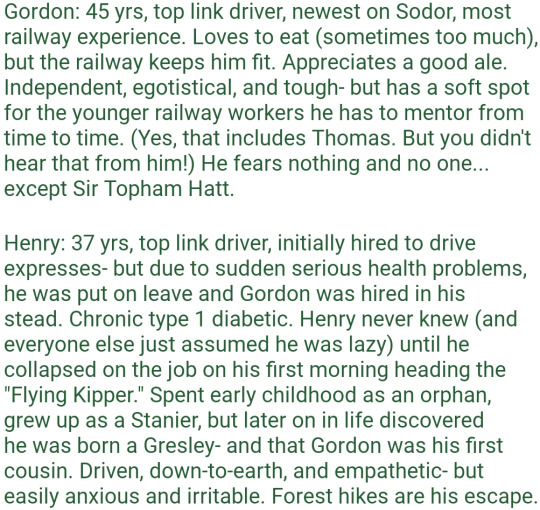
Henry and Gordon as drivers/engineers! (+ some lore)
#ttte humanized#humanized version#thomas and friends#ttte#gordon the big engine#henry the green engine#ttte gordon#ttte henry#thomas the tank engine#fanart#ttte au#island of sodor
268 notes
·
View notes
Text
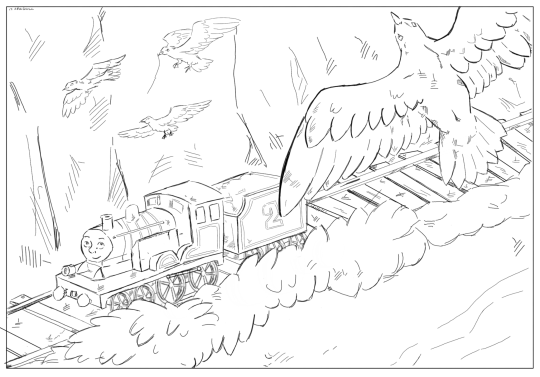
17. Seagull - Tornadoyoungiron's traintober list
<Prev | Next >
I love drawing Edward, he's such a peaceful character. Waiting on @axiondelta to colour this one so I'll upload this version in the meantime.
#thomas and friends#artists on tumblr#thomas the tank engine#ttte#nobleatomicsrailway#seagull#beach#edward the blue engine#edward ttte#ttte edward#edward#island of sodor#coastal railway#this just looks so serene#traintober2024#traintober#traintober 2024
95 notes
·
View notes
Text
imagine looking at google maps streetview on sodor. you get to see the back of trevor and his cart for like an entire road. thomas and bertie are looking suspiciously at the streetview car at ffarquhar station. bulgy is shouting at someone in a street. various trains in the background for 80% of it
#I wish sodor was real#ttte#fanfic potential thomas and bertie meet the google maps streetview car#thomas the tank engine#island of sodor
128 notes
·
View notes
Text
#thomasandfriendsart
#ttte#ttteartist#thomas and friends fan comic#thomas and friends au#thomas and friends#thomas the tank engine#ttte humanized#ttte thomas#thomasandfriends#tttehumanized#thomasthetankengine#thomas the train#thomasthetrain#thomasengine#thomasthecuteengine#thomasthetrainfanart#thomasthetrainau#thomas the train fan#ttte sodor#island of sodor#sodor#ttte fanart#thomas ttte#thomas the train au#thomas human au#ttte art#ttte humanization au#fan comic#fan art
32 notes
·
View notes
Text
Usagi redraw challenge.


Usagi redraw but it’s Douglas from TTTE aka Sodor Magic. Hope you’ll like it because I’ve took my time and worked really hard on this. Reblogs, shares and comments are appreciative
#sodor magic#ttte Douglas#sailor moon redraw#ttte#thomas and friends#thomas the tank engine#ttte human au#Ttte humanized#ttte au#island of sodor#art#redraw challenge#humanized version#ginjinka
45 notes
·
View notes
Text

That would be fascinating. I wonder if anyone has done it? It’s something that seems sorely under explored. We do have
And
https://archive.org/details/the-island-of-sodor
as reference.
#thomas and friends#thomas the tank engine#ttte#ttte confessions#ttte thomas#thomas the train#island of sodor#sodor
16 notes
·
View notes
Text
⚡️⚡️ Full battle armour/War veteran Thomas ⚡️⚡️
Once the WWI styled trench coat comes on, start running because he’ll no longer hold back.

#ttte#thomas the tank engine#thomas and friends#island of sodor#ttte fandom#ttte thomas#ttte humanized#ttte human au#ttte gijinka#human au#humanisation#humanization#humanized#humanised#ttte fanart#ttte fantasy au#ttte art#fantasy au#fan lore#lore#Thomas actually used to hate#his trench coat bc it reminds him of the war#but after the mainland incident with Frankie and Hurricane#he’s starting to become more comfortable using it
22 notes
·
View notes
Text
When you realise that the first TTTE episode released 40 years ago

Happy 40th birthday you little blue rascal
#ttte#thomas and friends#thomas the tank engine#trains#ttte thomas#thomas and friends season 1#thomas the tank engine and friends#Thomas the tank engine and friends season 1#thomas and gordon#ttte 40th anniversary#40 years of Thomas#Thomas is a tank engine#who lives at a big station on the island of sodor#he's a cheeky little engine#with 6 small wheels#a short stumpy funnel#a short stumpy boiler and a short stumpy dome#where did the time go?#I'm still coming to terms with this#how has it been 40 years#wow
27 notes
·
View notes
Text

I realized that those hillbilly engines from Misty Island Rescue existed so I decided to make them mascots for a Mtn. Dew-type soda called "Misty Moonshine" in my AU.
#art#my art#ttte bash#ttte dash#ttte ferdinand#sodor uk#misty island rescue#thomas and friends human au#thomas the tank engine
60 notes
·
View notes
Note
Damn, Hiro looks too good in your style. We should see him more often.
thank you! I agree! I adore hiro so much…… I even have his backstory and role in the HOTR arc of cstm planned out

#asks#anonymous#ttte hiro#ttte spencer#senjart#casa tidmouth#drawing with ipad… it’s a bit hard but I’m managing#still learning how to draw his haori from various angles accurately#also hiro is one of the most important minor characters because-#-hes considered one of sodor’s only gold dust patrons that bridges the island and the outside world#if that makes sense
130 notes
·
View notes
Text

Edward always takes the old S&M express coaches on his shorter trips as these coaches love taking passengers.
"Come along please! Come along please!" Edward would sing.
"Trickitey-Trock it's just like old times! Trickitey-Trock it's just like old times!" The coaches would reply
#ttte#brendambois#thomas and friends#thomas the tank engine#island of sodor#the island of sodor#edward ttte#ttte edward#edward the blue engine#old coaches#old Express coaches#s&m#sodor and mainland
41 notes
·
View notes
Text
★。・:*Rock-a-bye Felix, you'll be alright
It's not your fault. There's no need to cry
Everything's okay with your friend Thomas
One day she'll pay for ruining Christmas :・゚★

#thomas and friends#thomas the tank engine#ttte#island of sodor#all engines go#creepypasta#grimdark#horror#monster engines#ttte oc
24 notes
·
View notes
Text
The Vicarstown Car Ferry

Above: This is not the Vicarstown car ferry train. I just needed a screenshot of a car on a train, and this was the closest I had to hand.
Every year, the Island of Sodor receives thousands of visitors from the Mainland, and obviously, the vast majority come by rail. A significant number, however, choose to arrive by car. Nowadays, this is no trouble, as they can simply drive across the Jubilee Bridge, which carries the main A950 road over the Walney Channel.
The bridge only opened in 1977, though, and any motorists arriving before then had to rely on the NWR's services to get themselves and their cars on and off of Sodor. And thereby hangs a fascinating tale about a little-known aspect of the NWR's history.
EARLY NWR EFFORTS
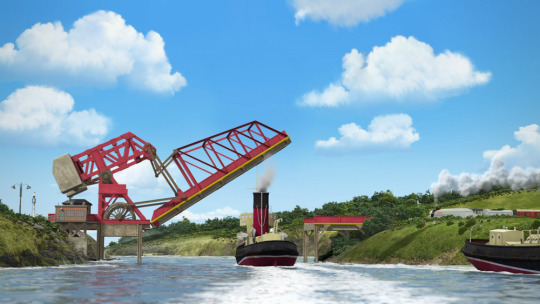
Above: The Vicarstown Bridge, in an undated view (obviously post-1975, given the presence of Spencer).
It all started with the construction of the NWR's own bridge over the Channel in 1915. In those days, there was no other link between Sodor and the Mainland, and thus no other way for goods and passengers to arrive. Some of those passengers wanted to bring their own horse-drawn carriages with them, and so was born one of the earliest vehicle-and-owner trains to run on Sodor. To begin with, it was simply a case of strapping the vehicle to a special carriage truck, and coupling it up to whatever passenger train its owner was travelling in. The truck then travelled as far as the nearest station to wherever the owner was going, where it was detached and the vehicle rolled off.

Above: For a time, the NWR also offered the use of a horsebox in conjunction with a carriage truck, so that the carriage’s owner could take his own horse with him, and avoid having to search for one at the other end of his journey. This cost extra, though, so there were few takers.
THE VICARSTOWN CAR FERRY
With the boom of private motoring in the early-1920s, there came a similar explosion in demand for the carriage of road vehicles by rail. This in turn resulted in the NWR running its first dedicated car-carrying trains - albeit only on an as-and-when basis, and with cars and drivers travelling in separate trains. The NWR did not return to vehicle-and-owner trains until 1927, when it launched a regular car ferry service between Vicarstown and Barrow-in-Furness - probably the best-known of all its car-carrying trains.
This new service had been made possible by the 1925 LMS Agreement, which gave the NWR running powers into Barrow, and in turn required Vicarstown to be converted for through running. Among the changes which resulted was the conversion of the adjoining goods depot to handle parcels and mail (goods facilities moving to a new depot elsewhere), and the closure of the existing parcels platform. This platform was thus free for conversion into a loading dock for the new car ferry service.
OPERATIONS
Throughout the fifty years the car ferry service ran, the basic pattern of its operation remained much the same, with only details like the motive power, rolling stock and timings seeing much change. It is thus worth looking at a typical journey for the service, starting at Vicarstown and ending at Barrow.
Below: A vague representation of how the loading process would have looked. I've employed a bit of artistic license with this photo: while the NWR did have some enclosed double-decker car carriers, these were never used on the car ferry services.

To begin with, the consist for that particular crossing was shunted into the station - the carriage trucks going to the loading dock, and the passenger coaches to one of the through platforms. Drivers and passengers boarded their coaches, leaving their cars to be loaded by the station staff. Once loading was completed, the carriage trucks were marshalled and coupled to the coaches. All shunting was done by the train engine, who then ran round to the front and hauled the train to Barrow. On arrival, the whole train was shunted to the loading dock there, where passengers and cars were unloaded together. The stock was then taken away for servicing. Of course, it goes without saying that in the opposite direction, the whole procedure was repeated, only in reverse.
In all, ten car ferry trains ran daily (five in each direction), with provisions in the working timetable for an extra four (two in each direction) if they were needed - say, during the busier summer months. To avoid overcrowding, a maximum of 20 cars were allowed on each crossing, and motorists had to book in advance. This enabled staff to work out how many carriage trucks were required, and what types, well ahead of time. It also allowed them to work out how many passenger coaches were needed - the rule here was that there should be at least one compartment for every car carried.
In the early 1930s, the NWR began allowing larger commercial vehicles to make use of the car ferry trains, and this required a slight amendment to the 20 cars rule. This amendment counted the size of a vehicle in car lengths - if, for example, a lorry turned up which was as long as three cars, then it took up three slots on that particular crossing. Any number of vehicles could thus travel on a single train, so long as their total length did not exceed 20 car lengths.
STOCK
The car ferry trains never had a specific engine allocated to run them - generally, any engine could do the job if they happened to be at Vicarstown or Barrow at the right time. As the NWR’s locomotive roster expanded, the car ferry became the exclusive preserve of the engines based at either of those sheds - the job generally being allocated to any engine who wasn't busy anywhere else that day.
The car ferry was also a neat way of getting an engine from one station to the other, without having to find an extra path for a light engine movement. For similar reasons, it was not uncommon for visiting LMS (later BR) engines to take charge of a Barrow-bound car ferry on their way home.
Below: An example of a long-wheelbase covered carriage truck. Many were later converted for parcels, newspapers or general goods traffic. This particular example went into departmental service, and in this view is carrying engine parts.

As far as rolling stock was concerned, this mainly consisted of both open and covered carriage trucks (henceforth referred to as OCTs and CCTs respectively). When the service first started, cars were carried on short-wheelbase OCTs, but these proved unpopular with motorists, as the cars often had their paintwork spoiled by smoke and soot spewing from passing engines - and sometimes from the engine pulling the train! The NWR tried to remedy this by offering the use of protective tarpaulins, but eventually they decided it would be more prudent to switch to CCTs instead.
Single cars were carried in short-wheelbase vans, similar in design to the GWR’s Mogo vans.
For pairs of cars, longer wheelbase CCTs could be used.
For trios or quartets, bogie CCTs were employed.
When larger commercial vehicles began to be carried, bogie OCTs were used - converted from the underframes of the fabled Dublin Stock.
Because of the aforementioned one compartment for every vehicle rule, the passenger coaches were at first quite a motley collection, with the numbers being made up by any old stock just lying around. It was only from the 1930s onwards that more consistent rakes of coaches began to be used - starting with Ironclad-pattern stock, moving on to Maunsell-pattern just after the War, and finishing up with Bulleid-pattern in the BR era.
MOTORAIL
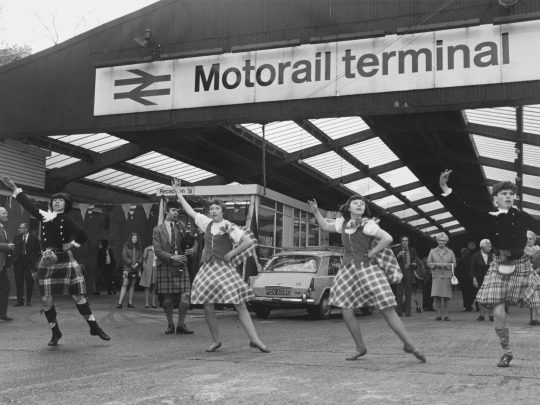
Above: A display of Scottish country dancing at...I think it's Kensington Olympia? No, I don't know why either.
In the 1960s, British Rail officially launched its Motorail service, offering fast travel for passengers and their cars to all parts of the country. To serve Sodor, one of the new services ran twice daily between Kensington Olympia and Vicarstown, and the latter’s existing loading dock was upgraded into a terminal. Two of the car ferry's ten daily crossings clashed with the proposed timings of the new Motorail services, and so were slashed from the timetable. Other than that, the car ferry was able to carry on as normal.
By then, the rolling stock used for the car ferry was beginning to show its age, and a programme of gradual replacement was implemented from about 1966 onwards:
For cars, General Utility Vans replaced the old bogie CCTs, which were retained for parcels traffic.
For commercial vehicles, Carflats replaced the OCTs, which were either scrapped or placed into departmental service.
Finally, for passengers, some of the NWR’s own allocation of BR Mk1s replaced the Bulleid-pattern stock.
The car ferry trains continued unabated into the 1970s, but it was clear they were running on borrowed time - for the first time, demand was beginning to outstrip capacity, and there was no room in the timetable to run extra trains. Then, exactly fifty years after the car ferries had first began, came a blow from which they were never to recover.
THE JUBILEE BRIDGE
That year saw the opening of the Walney Road Bridge, to mark the Silver Jubilee of Queen Elizabeth II. Needless to say, this snuffed out the NWR's car ferry monopoly in an instant. Nobody was more incensed at this development than Sir Topham Hatt, and he saw to it that the NWR was substantially compensated for the extinguishment of their ferry rights.
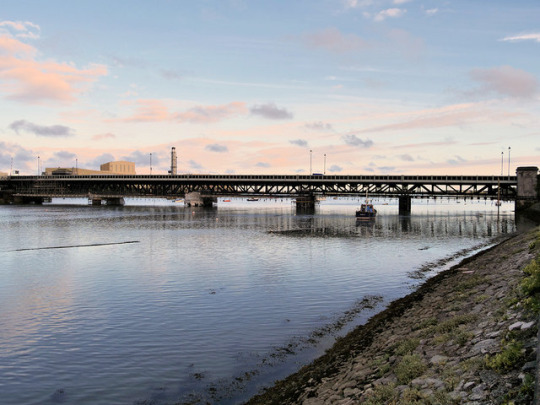
Above: The Jubilee Bridge. Visitors to Barrow (and native Barrovians, too) may think that this is the only bridge here. This is an illusion!
All was not totally lost, however, for 1977 also saw the extension of BR's existing London-Vicarstown Motorail service to a brand new terminal at Killdane - a more convenient base for the visiting motorist to explore Sodor. Such was the success of this new service that further others were introduced, linking Sodor with other provincial centres. Some of these services employed the stock which had previously worked the car ferry trains.
MODERN DAY MOTORAIL
The expansion of Sodor's Motorail services came during a period of gradual decline for the brand across the rest of BR. The expansion of Britain's motorways, the improvement of car technology, and the chaos of privatisation all ultimately conspired to kill off Motorail by the early-1990s.
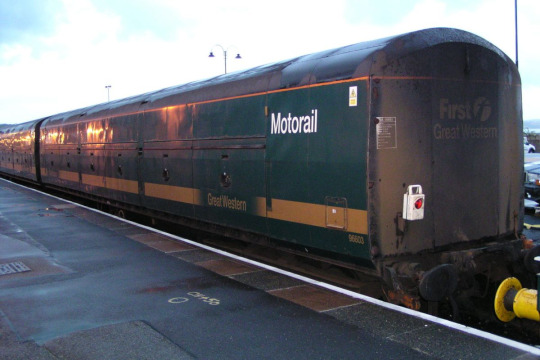
Above: First Great Western briefly revived the Motorail concept in the early-2000s, using a fleet of converted GUVs.
Despite this, Motorail on Sodor has continued to flourish into the present day. Not only are its existing terminals at Vicarstown and Killdane still in operation, but there is now a third terminal at Tidmouth. These form the basis for the NWR's current Motorail services, which all serve to help solve a very basic problem.
The thing is, many visitors to Sodor now arrive in their own cars, but the island's road transport infrastructure isn't really suited to the needs of the long-distance motorist. Fortunately, the NWR has them covered. Special car-carrying trains now run regularly between the Motorail terminals at Vicarstown, Killdane and Tidmouth. While you still have to book in advance, it's a small price to pay for having the convenience of a car at your disposal, without the insanity that comes from having to drive it all the way across Sodor.
Of course, while the NWR's Motorail trains are available to all motorists (local and foreign) the majority of their customers are Mainlanders - the typical Sudrian would just as soon leave his car at home altogether!
#thomas the tank engine#the railway series#sodor#island of sodor#ttte headcanon#ttte analysis#north western railway#vicarstown#vicarstown bridge#barrow in furness#car ferry
50 notes
·
View notes
Text

I watched misty island rescue with @m0th1c last night
#why DO either of these ‘bridges’ exist#I love the old architects of sodor & misty island WHO designed these#💖single truck ferry my beloved💖#😟misty island zipline bridge my beloathed😟#imaging running out of materials to make a bridge and then you hear one of your coworkers in the back saying hold on guys I have an idea#ttte#thomas the tank engine#misty island rescue
23 notes
·
View notes